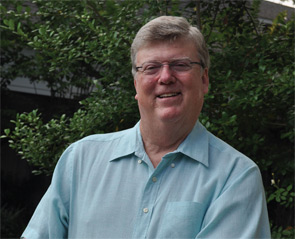
In January 2006, Craig Plumhoff of Houston was sick. “I started feeling extreme fatigue,” says Plumhoff, “and I was also having problems with my lungs. Doctors originally thought it was bronchitis and then viral pneumonia.” His doctors put him on antibiotics, but two weeks later he ended up in the intensive care unit at St. Luke’s Episcopal Hospital in Houston with critically low sodium levels.
Plumhoff could not elevate his legs off the bed and was very weak. He was told his creatine phosphokinase (CPK) count was 22,000—way above normal.
He ended up spending a month in the hospital. Rheumatologist Alan Friedman, MD, was part of the team of specialists who were consulted to help make a diagnosis. Later, Dr. Friedman told Plumhoff that he suspected early on what the problem was, but wanted to run complete tests before he went to work on treating him.
After 10 days of intense testing, the doctors confirmed Plumhoff’s diagnosis: polymyositis with associated interstitial lung disease (antisynthetase syndrome with Jo-1 antibodies).
“At that point, Dr. Friedman became the principal quarterback directing my care,” Plumhoff says. Dr. Friedman acted quickly, getting Plumhoff started on an aggressive medication therapy. “After I was released from the hospital, I was still very weak and confined to my home,” says Plumhoff. “One day, Dr. Friedman called me with my lab results and he was so excited, I thought I was at a pep rally. My CPK count had finally gone down and I had started responding to the treatment.”
Dr. Friedman was also receptive to Plumhoff’s request to include Richard Meehan, MD, and Stephen Frankel, MD, in his care. Dr. Meehan is a longtime friend of the Plumhoffs, and is chief of rheumatology at National Jewish Health in Denver. Dr. Frankel is assistant director of the interstitial lung disease program at the hospital. Working together, they mapped out a long-term treatment plan for Plumhoff and have continued to cooperate in monitoring his progress and adjusting his medications over time.
Once Dr. Friedman had his symptoms under control, Plumhoff began thinking about ways to help others like him. “Let’s face it—I’ve been there, and it’s not easy to go through,” he says. “I’d been given an opportunity, and I wanted to give back for what’s been given to me.”
He spoke to Dr. Friedman about his interest. As a member of the ACR Research and Education Foundation (REF) board of directors, as well as an REF From the Field speaker, Dr. Friedman is well aware of the unique role the REF plays in supporting rheumatologists and rheumatology research.
“As rheumatologists, we are the most aware of the unmet needs in research toward finding the underlying causes and eventually the cures for rheumatic diseases,” Dr. Friedman says. “The REF is working for us and our patients to help fund cutting-edge research in an era when government sources are less able to provide that kind of support.”
Plumhoff was eager to connect with the REF.
“I like to get really involved in what’s going on, instead of just seeing a doctor and taking medications,” he says.
Soon, he began hosting a Coffee & Conversation gathering in his home for the REF. These small, informal events are designed to stimulate meaningful conversations about inflammatory diseases from the viewpoint of patients and families, while also offering insight into the research funded by the REF.
In addition, Plumhoff joined a panel of volunteers who answer questions from other patients on the REF Facebook page.
“If I could talk to someone going through what I went through,” says Plumhoff, “I’d say: ‘knowledge is power.’ Learn as much as you can about your disease. And secondly, get active.”
Plumhoff is thankful to Dr. Friedman for connecting him with the REF, since he thinks it’s important to fund rheumatology research and to develop the careers of future rheumatologists.
“With the aging population, more and more people are going to be hit by these diseases that are less well known. Rare conditions need to have their share of funding for research,” says Plumhoff. “And, if I didn’t have access to these fine doctors, I don’t think I’d be alive right now.”
Dr. Friedman feels that the more patients know about the REF, the more they will want to be involved. “The REF is committed to promoting rheumatology as a specialty by assisting in the training of young physicians and scientists to pursue this field and develop successful research careers. The patients have a huge stake in our success, and many are eager and proud to contribute to our efforts if we give them an opportunity.”
Do you know a patient who has a compelling story like Plumhoff’s? Is your patient interested in recent discoveries surrounding their disease? The REF encourages patients and their family members to learn more about what steps are being taken today to advance treatment and find cures for rheumatic diseases. Let them know they can stay connected by subscribing to our e-newsletter, liking us on Facebook, or sharing their story.
If you would like to share research efforts with your patients, contact Alysse Kong at [email protected] or (404) 633-3777 to receive the latest materials and up-to-date information from the REF.